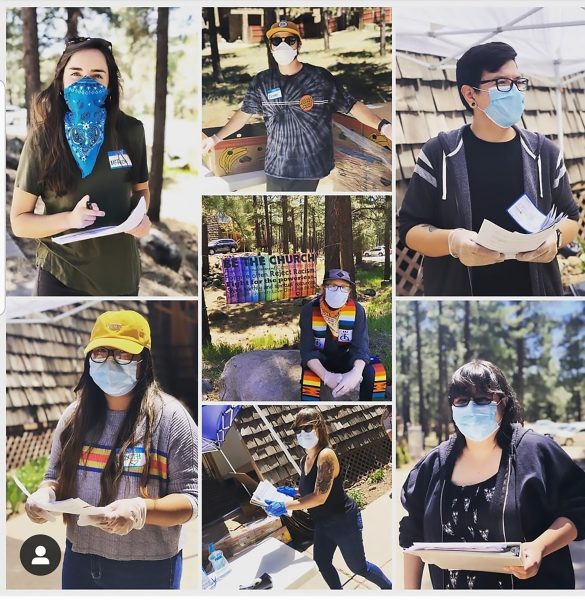
Health inequities in a time of COVID-19
According to a study by the Pew Research Center, about half of lower-income Americans report household job or wage loss due to COVID-19. Many partner organizations of the Center for Health Equity Research (CHER) are feeling the pandemic.
Heather Williamson, assistant professor for CHER and the Department of Occupational Therapy, said that people living with disabilities face many challenges associated with COVID-19.
“Students with disabilities and their families are facing challenges in receiving mandated special education services under the Individuals with Disabilities Education Act while school operations are functioning in a virtual environment,” Williamson said. “Many adults with disabilities are living with families or in a congregate care setting and receive daily supports from direct support professionals, all of these arrangements make social distancing a challenge.”
She said that people with disabilities have higher rates of comorbid chronic health conditions compared to the general population, which may make their ability to recover from COVID-19 more challenging.
“For those people with disabilities hospitalized with COVID-19, they will lose the ability to have a family member or other care provider with them present in the hospital setting to assist (as needed) with communication of preferences,” she said. “As health professionals deal with shortages of ventilator equipment, there is also concern that people with disabilities may be considered a lower priority for accessing necessary life-saving measures.”
Effect of COVID-19 on underserved communities
The impact of COVID-19 is not equal. According to data from the Centers for Disease Control and Prevention, underserved communities, often communities of color, have consistently navigated tremendous health disparities such as poverty, unemployment, and limited access to health care services, and are less able to weather the brunt of the pandemic. In fact, COVID-19 has disproportionately claimed the lives of people of color in most jurisdictions within the U.S.
In northern Arizona, we are hearing about the impact on American Indian/Alaska Native (AI/AN) communities. The National Congress of American Indians and other AI/AN-led organizations have identified several conditions that increase Native peoples’ greater vulnerability including overcrowded multi-generational homes, existing food insecurity issues, limited broadband internet access and infrastructure, and increased chronic health conditions such as heart disease, cancer and diabetes.
According to Nicolette Teufel-Shone, associate director of CHER and a professor in the Department of Health Sciences, the most devastating outcome of this pandemic is the long-term structural inequity.
“Since the establishment of the reservation system, tribes have been forced, as an economic survival tactic, to be creative in leveraging their right to establish gambling institutions/casinos and to use their remote locations for tourism,” Teufel-Shone said. “During this pandemic, this reliance has now magnified the inequity. Many workers are employed in occupations in which working from home is not an option.”
Teufel-Shone said that prior to the pandemic, AI/AN populations in the U.S. had a poverty rate of 25.4%, and on some reservations the rate is almost 40%.
“There needs to be broader awareness that these conditions of poverty are the result of centuries of assimilative and dispossessive federal policy actions that have severely impacted Native communities, governance and land,” said Carmenlita Chief, a senior program coordinator with CHER. “Due to the slow response from the federal government for relief funding and assistance, some grassroots Native community organizers have unified and created local relief fund campaigns.”
Supporting communities in solidarity
Some of the Southwest Health Equity Research Collaborative’s (SHERC) Community Engagement Core team members, when they are not working as researchers, find ways to respond to the needs of communities impacted by health inequity during this pandemic.
CEC member Alexandra Samarron Longorio engages in community organizing outside of her research role to create networks of solidarity and support among the immigrant community in Flagstaff. Alexandra is a community organizer with El Pueblo de Flagstaff, an organized network of Flagstaff community members prepared to protect the wholeness and wellness of our communities that are being targeted and torn apart by ICE.
El Pueblo de Flagstaff has organized the Mutual Aid Project, “Unidos Sobrevivimos” (United We Survive), to build mutual relationships of solidarity that are fundamental to a just and resilient community for all in the time of COVID-19.
“Unidos Sobrevivimos Mutual Aid Project has the intention to create a care support system with different members of the community, especially among immigrants in Flagstaff,” Samarron said. “It’s time to act in solidarity as a community and share information or services available for everyone regardless of immigration status. Unidos Sobrevivimos is not founded on charity values, but instead values that create mutual aid networks since all of us need from each other in this moment.”
Resources
Arizona Association of Providers for People with Disabilities (AAPD) has resources regarding COVID-19 and people with disabilities: http://aappd.org/blog/post/covid-19-updates
Arizona Disability Law has resources for families regarding accessing special education resources:
https://www.azdisabilitylaw.org/wp-content/uploads/2020/03/COVID-SPED-Resource-update-4.9.20.pdf
The Arc also provides educational resources for COVID-19 in plain language formats and updates on policies influencing resource access for people with disabilities:
Links to contribute monetary donations for Arizona tribes:
- Havasupai Tribe COVID-19 Relief Fund https://www.gofundme.com/f/havasupai-tribe-covid19-relief-fund
- Kahtoola Virtual Run to Benefit Havasupai Tribe COVID-19 Relief Fund (thru May 10) https://runsignup.com/Race/AZ/None/Kahtoolavirtualrun#
- Navajo & Hopi Families COVID-19 Relief Fund (Grassroots fundraising) https://www.gofundme.com/f/NHFC19Relief
- Official Navajo Nation COVID-19 Relief Fund (Tribal government fundraising)
- Protect Our Heroes – Navajo Nation https://www.gofundme.com/f/Protect-Those-Who-Help-Protect-Us?utm_source=customer&utm_medium=copy_link-tip&utm_campaign=p_cp+share-sheet
- Hopi Tribe COVID-19 Donations https://www.hopi-nsn.gov/wp-content/uploads/2020/04/Donations-FINAL.pdf
To date, Unidos Sobrevivimos has raised more than $60,000 and has begun dispersing those funds in $500 grants to our undocumented community members to help sustain utility, rental and other living expenses.
To learn more about this effort and to donate visit the COVID-19 Fund for Flagstaff’s Immigrant Families website.
- Go Fund Me: https://bit.ly/3ca3rxQ
- Resource List: https://tinyurl.com/y8wzguow
- Facebook Page: https://www.facebook.com/UnidosSobrevivimos/
Spring 2020
CHER/SHERC
Newsletter